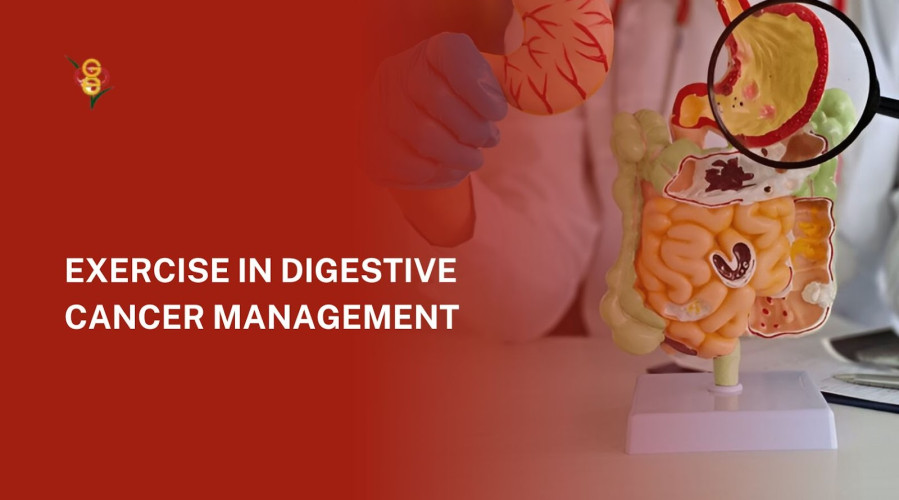Learn effective solutions for digestive problems with expert tips to improve gut health, reduce discomfort, and maintain a healthy digestive system.
The Role of Exercise in Managing Digestive Cancer

Digestive cancer is a collective term for cancers of the digestive system including stomach, liver, pancreas, colon and oesophagus cancer. It requires a comprehensive approach with a combination of medications, lifestyle modifications, and supportive treatment. Regular exercise is one of the most effective and natural ways to help manage the condition.
Exercise benefits overall health, aids recovery, and improves cancer patients’ quality of life. It hasn’t replaced any treatment, but I can tell you that being active makes a huge difference in how you manage symptoms and the side effects of cancer treatment.
How Exercise Helps in Digestive Cancer Management
1. Boosts Energy Levels
Cancer treatments such as chemotherapy and radiation may lead to debilitating fatigue. Engaging in regular physical activity increases stamina, minimizing fatigue and improving overall energy levels. Even simple exercises, like walking, can help quite a bit.
2. Improves Digestion
Physical activity stimulates the digestive system, preventing constipation and other conditions affecting digestion such as bloating, common in cancer patients. Engaging in activities such as yoga and stretching can be especially effective ways to keep the digestive system moving.
3. Supports Immune Function
A healthy immune system is essential for combating cancer and healing from treatment. Moderate activity improves the body’s ability to combat infections, lowers inflammation, and bolsters overall immunity.
4. Reduces Stress and Anxiety
Emotionally, navigating digestive cancer can be difficult. Exercise releases endorphins, or “feel-good” hormones, that can help alleviate stress, anxiety and depression. Great life practices for relaxation and mental well-being are mind-body activities including yoga and tai chi.
5. Helps Maintain a Healthy Weight
Excessive weight gain or loss can hinder cancer recovery, so keeping an eye on your health is important. A nutritious diet alongside regular exercises can help to maintain body weight without leading to serious complications.
6. Enhances Muscle Strength and Flexibility
Muscle weakness and stiffness can be a result of some cancer treatments. Gentle strength training and stretching exercises can help rebuild muscle strength and flexibility. It is critical for sustaining mobility and minimizing treatment-related discomfort.
7. Reduces Side Effects of Treatment
Exercise has been found to help diminish side effects, including nausea, neuropathy (nerve pain) and sleep issues. Furthermore, it enhances blood circulation and starts carrying fresh oxygen to the tissues, accelerating the process of healing.
Best Exercises for Digestive Cancer Patients
Although every individual’s exercise program must be specific to his or her fitness level and medical status, here are some of the most advantageous, safe exercises:
- Walking: It is a very simple and effective way of keeping ones body active without stressing it.
- Yoga: Assists with flexibility, digestion, and mental relaxation.
- Strength Training: A bit of light weight lifting or resistance band exercises in order to hold muscle strength.
- Swimming: An easy on the joints, low-impact exercise that encourages relaxation.
- Stretching: It keeps the muscles supple and makes it a great way to release tight and stiff muscles.
As always, please speak with your doctor or a physiotherapist before beginning any exercise regimen to ensure the exercise is appropriate for you.
Tips for Safe Exercise During Digestive Cancer Treatment
- Start with light activities and gradually increase intensity.
- Listen to your body and rest when needed.
- Stay hydrated and follow a healthy diet.
- Choose exercises that you enjoy to stay motivated.
- Seek professional guidance if you experience pain or discomfort.
Track cardiac exercise in patients with the digestive cancer, chest radiation, or systemic chemotherapies. But even if you are staying active, that should be done under medical guidance, to ensure you are safe.
At GEM Hospital, our cancer specialists do in-depth analysis and suggest individualized treatment strategies according to the patient needs to aid recovery. If you or your loved one is searching for the best digestive cancer treatment, schedule your appointment with our specialists today.
Blogs & Article
Explore current research trends in digestive health, including new treatments, advanced diagnostics, and innovations improving gut health and patient care.
Discover common digestive health myths and the real facts. Learn simple tips to improve gut health and maintain better digestion for a healthier life.


